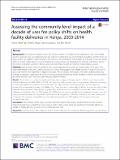| dc.contributor.author | Obare, Francis | |
| dc.contributor.author | Abuya, Timothy | |
| dc.contributor.author | Matanda, Dennis | |
| dc.contributor.author | Bellows, Ben | |
| dc.date.accessioned | 2022-04-11T20:55:52Z | |
| dc.date.available | 2022-04-11T20:55:52Z | |
| dc.date.issued | 2018-05-25 | |
| dc.identifier.citation | Obare, F., Abuya, T., Matanda, D. et al. Assessing the community-level impact of a decade of user fee policy shifts on health facility deliveries in Kenya, 2003-2014. Int J Equity Health 17, 65 (2018). https://doi.org/10.1186/s12939-018-0774-4 | en_US |
| dc.identifier.other | DOI: 10.1186/s12939-018-0774-4 | |
| dc.identifier.other | PMCID: PMC5970478 | |
| dc.identifier.other | PMID: 29801485 | |
| dc.identifier.uri | https://repository.amref.ac.ke/handle/123456789/654 | |
| dc.description | © The Author(s). 2018 Open Access This article is distributed under the terms of the Creative Commons Attribution 4.0
International License (http://creativecommons.org/licenses/by/4.0/), which permits unrestricted use, distribution, and
reproduction in any medium, provided you give appropriate credit to the original author(s) and the source, provide a link to
the Creative Commons license, and indicate if changes were made. The Creative Commons Public Domain Dedication waiver
(http://creativecommons.org/publicdomain/zero/1.0/) applies to the data made available in this article, unless otherwise stated. | en_US |
| dc.description.abstract | Background: The long-term impact of user fee removal policies on health service utilization in low- and middleincome
countries may vary depending on the context in which they are implemented, including whether there are
policy actions to support implementation. We examined the community-level impact of a decade of user fee policy
shifts on health facility delivery among poorest and rural women and compared the changes with those among
the richest and urban women in Kenya using data from three rounds of nationally representative surveys.
Methods: Data are from births occurring in the 5 years preceding the survey to women aged 15-49 years who
were interviewed in the 2003, 2008-2009 and 2014 Kenya Demographic and Health Surveys. A total of 5949, 6079
and 20,964 births were reported in respective surveys. We conducted interrupted time series analysis predicting
changes in quarterly proportions of births occurring in public and private health facilities as well as at home before
and after the 2004, 2007 and 2013 user fee policy shifts in Kenya.
Results: There were no statistically significant immediate changes in the proportion of births occurring in public
facilities following the 2004, 2007 and 2013 user fee policy shifts among poor or rural women. There was, however,
a statistically significant increase in home deliveries among all women and among those from the poorest
households immediately following the 2004 policy. There was also a statistically significant increase in public facility
deliveries among women from the two top quintiles, which was accompanied by a statistically decline in home
deliveries immediately after the 2007 policy shift. Differences in trends in public facility deliveries between pre- and
post-policy periods were not statistically significant for all sub-groups of women, indicating that even among the
sub-group that experienced significant immediate increase after the 2007 policy shift, this pattern was not
sustained over time.
Conclusion: The findings of this paper provide empirical evidence that poorly implemented user fee removal
policies benefit more well-off than poor women and in cases where there are significant immediate effects on
uptake of facility delivery, this trend is not sustained over time. | en_US |
| dc.description.sponsorship | International Initiative for
Impact Evaluation (3ie) | en_US |
| dc.language.iso | en | en_US |
| dc.publisher | BMC | en_US |
| dc.subject | Economically disadvantaged sub-groups | en_US |
| dc.subject | Kenya | en_US |
| dc.subject | Maternal health service utilization | en_US |
| dc.subject | Policy shifts | en_US |
| dc.subject | Policy shifts | en_US |
| dc.subject | User fee | en_US |
| dc.title | Assessing the Community-level Impact of a Decade of User Fee Policy Shifts on Health Facility Deliveries in Kenya, 2003-2014 | en_US |
| dc.type | Article, Journal | en_US |

